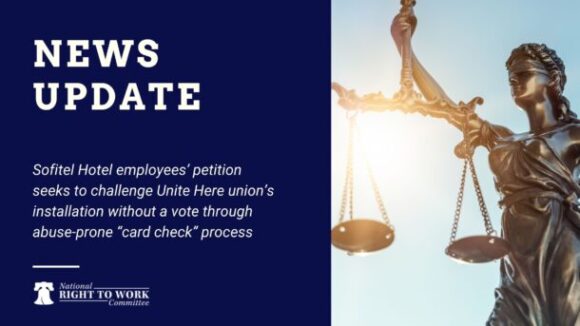Foundation Fires Back Against Biden NLRB ‘Card Check’ Mandate
Brief challenges Labor Board’s attempt to expand coercive, anti-employee organizing scheme
One thing is clear: Enactment of the Card Check Scam Bill will impose forced unionism on millions of Americans who do not want to join a union. But there is another impact — it will kill jobs and raise the cost of goods and services.
Dan Morain, writing in the Los Angeles Times, notes the bill is already creating a problem for president-elect Obama — and its true job-killing impact hasn’t been felt. Big Labor is pressing hard for its enactment, however; Obama needs to work with business to create jobs at this critical time for the economy.
But Morain’s news story doesn’t tell the whole story. The liberal Denver Post is more direct in its advice for the new president:
Barack Obama has pledged to be the president of all the people after he’s inaugurated Jan. 20.
We hope so. It could prove to be difficult, considering his party strengthened its majority status in Congress and some of the special- interest groups that helped propel the gains will want some payback.
Obama and the Democratic majority should resist the urge to pay off organized labor by passing the divisive and unnecessary law known as “card check.”
It passed the House this year but stalled in the Senate. It would force-feed union organizing drives by ending the current requirement that gives workers the right to a secret ballot when deciding whether to unionize. Pushing card check would immediately endanger the new administration’s ties to the business community and complicate the delicate but vital task of getting the American economy back on track.
Labor played a supporting role in the Democratic sweep, but it was mostly Obama’s own efforts at energizing and organizing voters that put him in the White House. Business and labor did run ads assailing or praising candidates for their card-check stands. But the issue played only a marginal role in an election that turned on broader economic issues.
If Obama or congressional Democrats now put a card-check bill high on their agenda, they will risk a “Ritter moment” that would damage their relations with moderates and the business community. That’s what happened to Gov. Bill Ritter in 2007 when a bill gutting long-standing rules limiting “union shops” in the Colorado Peace Act hurtled through the legislature with little public input.
Ritter rightly vetoed that bill, but the move angered his labor supporters. Later that year, the governor tried to make amends by granting limited collective-bargaining rights to state employees. That move, in turn, alienated much of the business community. This year’s wholly avoidable fights over a right-to- work initiative and four anti-business initiatives that labor later withdrew all followed.
The Colorado squabbles weren’t worth it. Whatever benefits labor might have gained by disrupting a decades-long accord with business were far outweighed by the disruption these duels caused.
Likewise, if President Obama, House Speaker Nancy Pelosi and Senate Majority Leader Harry Reid put this ragingly insignificant card-check issue above the need to right the American economy, rationalize our health care system, rebuild the national infrastructure and revitalize American education, they will sacrifice the bipartisan spirit that Obama so dearly earned in his pathbreaking campaign.We hope the incoming Obama administration learns from Colorado’s example and sidelines the card-check bill while it pursues vastly more important goals.
There is no hiding the fact that pushing the Card Check Scam is bad — bad for workers, bad for politics and bad for the economy.
Brief challenges Labor Board’s attempt to expand coercive, anti-employee organizing scheme

Josh Hawley distances himself from pro-Right to Work pledges, aligning with union bosses like the Teamsters, despite their history of corruption.

Sofitel Hotel employees’ petition seeks to challenge Unite Here union’s installation without a vote through abuse-prone “card check” process